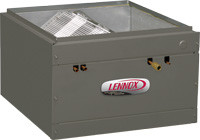St. Louis Dehumidifiers by Lennox

Too much humidity in the home can cause mold, mildew and bacteria to thrive. Dehumidifiers help reduce humid conditions in the home and thus reduce the risk of these problems.
Types of Dehumidifiers:
- Lennox Humiditrol EDA
- Honeywell Truedry
- Aprilaire 1700
Contact Scott-Lee Heating to discuss your dehumidifier options. We will help you find a dehumidifier system that is right for your home and budget. Call us today at (314) 756-9444 for a free consultation.
Frequently Asked Questions
What is a dehumidifier and how does it work?
A dehumidifier is a device that reduces humidity levels in the air by extracting excess moisture. It works by drawing in humid air, cooling it to condense the moisture, and then releasing dry air back into the room.
Why should I consider installing a dehumidifier in my home?
Installing a dehumidifier can help prevent mold, mildew, and bacteria growth, improve indoor air quality, reduce allergens, and create a more comfortable living environment by reducing clamminess.
What types of dehumidifiers are available?
Common types of dehumidifiers include coil-mounted dehumidifiers and bi-pass dehumidifiers. Coil-mounted models, like the Lennox Humiditrol EDA, are integrated into your HVAC system, while bi-pass models, such as the Honeywell Truedry and Aprilaire 1700, are standalone units.
How do I know if I need a dehumidifier?
If you notice high humidity levels, condensation on windows, mold growth, or a musty smell in your home, a dehumidifier can help address these issues by maintaining optimal indoor humidity levels.
Can a dehumidifier help with allergies?
Yes, a dehumidifier can help reduce allergens such as dust mites, mold spores, and mildew, creating a healthier environment for individuals with allergies or respiratory issues.
Where should I place a dehumidifier in my home?
Dehumidifiers are most effective when placed in areas with high humidity, such as basements, bathrooms, laundry rooms, or any space with poor ventilation. Proper placement ensures optimal performance and efficiency.
How often should I run my dehumidifier?
It’s generally recommended to run your dehumidifier continuously during humid seasons or as needed to maintain a humidity level between 30-50%. Adjust settings based on the specific conditions of your home.
What maintenance is required for a dehumidifier?
Regular maintenance for a dehumidifier includes cleaning or replacing filters, emptying the water collection tank or checking the drain hose, and ensuring the coils are free of dust and debris.
Can a dehumidifier improve HVAC efficiency?
Yes, by reducing the humidity level, a dehumidifier can help your HVAC system run more efficiently, as the air conditioner won’t have to work as hard to remove moisture from the air, leading to potential energy savings.
How does a dehumidifier affect energy consumption?
While dehumidifiers do consume energy, the overall effect can be positive as they can reduce the workload on your air conditioning system. Energy-efficient models and proper use can minimize energy consumption.
What is the lifespan of a dehumidifier?
With proper maintenance, dehumidifiers can last between 5-10 years. Regular cleaning and timely replacement of parts are essential to ensure longevity and optimal performance.
Can I use a dehumidifier in multiple rooms?
Portable dehumidifiers can be moved between rooms as needed, but for whole-house humidity control, an integrated system connected to your HVAC is more effective and convenient.
What features should I look for in a dehumidifier?
Key features to look for include adjustable humidistat, auto shut-off, energy efficiency, easy-to-clean filters, continuous drainage option, and capacity suitable for the area you need to dehumidify.
How do I choose the right size dehumidifier for my home?
The size of the dehumidifier depends on the area you need to dehumidify and the level of humidity. A professional assessment can help determine the appropriate capacity for your specific needs.
Are dehumidifiers noisy?
Noise levels vary by model, but many modern dehumidifiers are designed to operate quietly. Checking the decibel rating can help you choose a unit that meets your noise preference.
